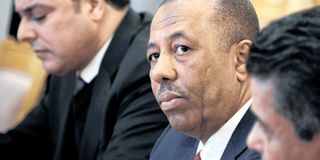Libya chaos deepens as Premier offers to quit in service row

A file picture taken on April 15, 2015 shows Libyan Prime Minister Abdullah al-Thani attending a meeting with Russian Foreign Minister in Moscow. AFP PHOTO
What you need to know:
- Country is gripped by unrest with Benghazi, the main city in the east, caught in a daily war.
- If my exit is the solution, then I announce it here, he says.
TRIPOLI
The future of Libya’s internationally recognised government was uncertain on Wednesday after Prime Minister Abdullah al-Thani said he would resign, as fraught peace talks were set to enter a second day.
It was unclear whether Mr Thani planned to follow through on his resignation vow, made during an emotional live television appearance where he faced a barrage of angry questions from citizens.
The move added to the political chaos in Libya, as the country’s rival factions were to meet for a second day of UN-sponsored peace talks in Geneva.
Mr Thani faced questions in the programme on Tuesday from Libyans blaming his government for the lack of basic services such as electricity and poor security in areas it controls.
“If my exit is the solution, then I announce it here,” Mr Thani said during the talk show. “My resignation will be submitted to the parliament on Sunday.”
CORRUPTION ALLEGATIONS
The prime minister, who escaped an assassination attempt in May when gunmen opened fire on his car after a parliament meeting, was also hit with accusations of corruption against his government in the television interview.
Libya, which plunged into chaos after the fall and killing of its leader Muammar Gaddafi in a 2011 revolution, has two rival governments and parliaments vying for power, as well as several militia groups battling for control of the country’s oil wealth.
The country is gripped by unrest with Benghazi, the main city in the east, caught in a daily war between pro- and anti-government forces.
Mr Thani’s government has been working out of a small eastern city near the border with Egypt since an Islamist militia alliance captured the capital Tripoli last year.
The international community recognises the parliament that sits in the eastern port city of Tobruk, which installed the controversial General Khalifa Haftar as its army chief in March.





